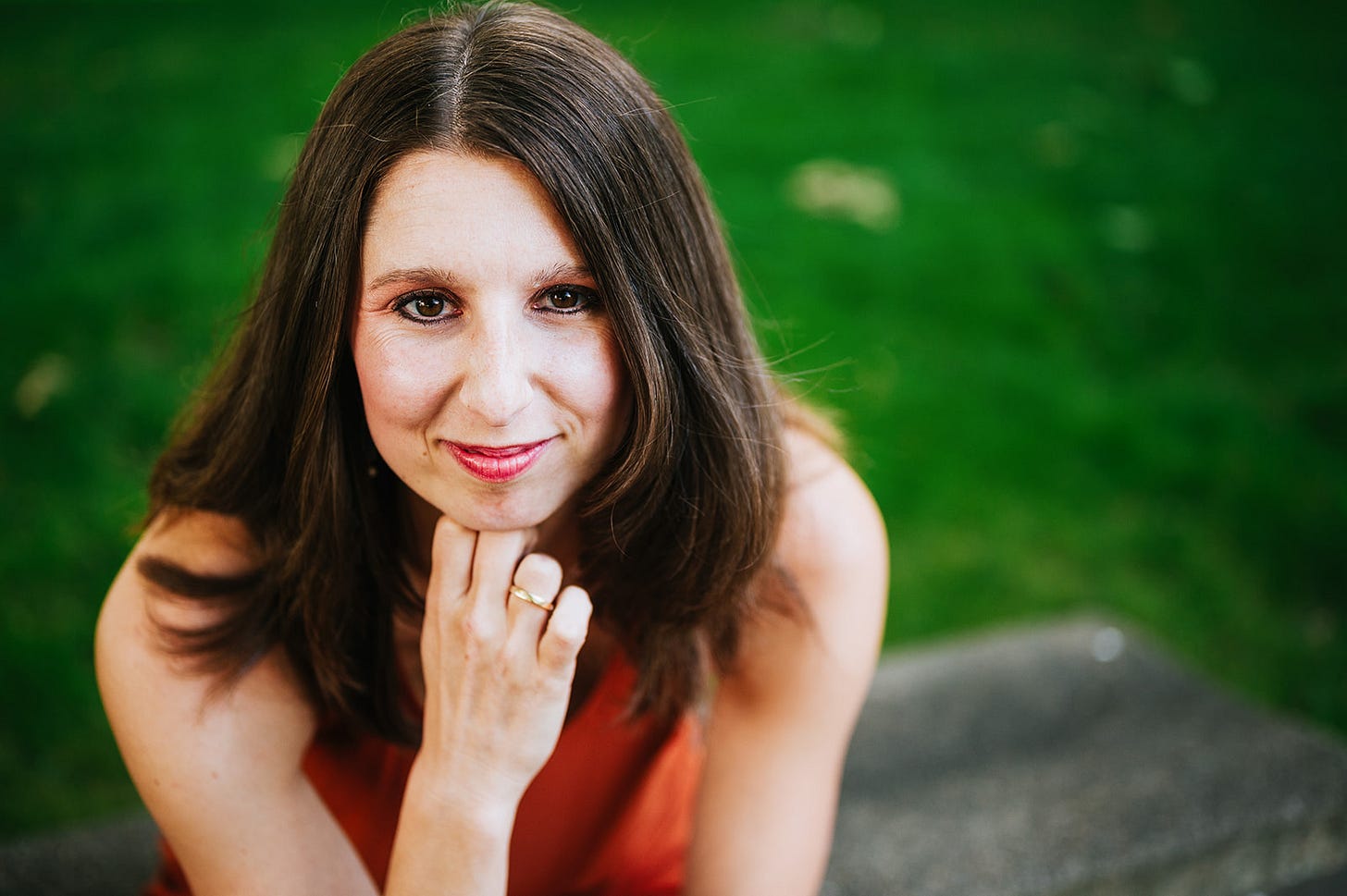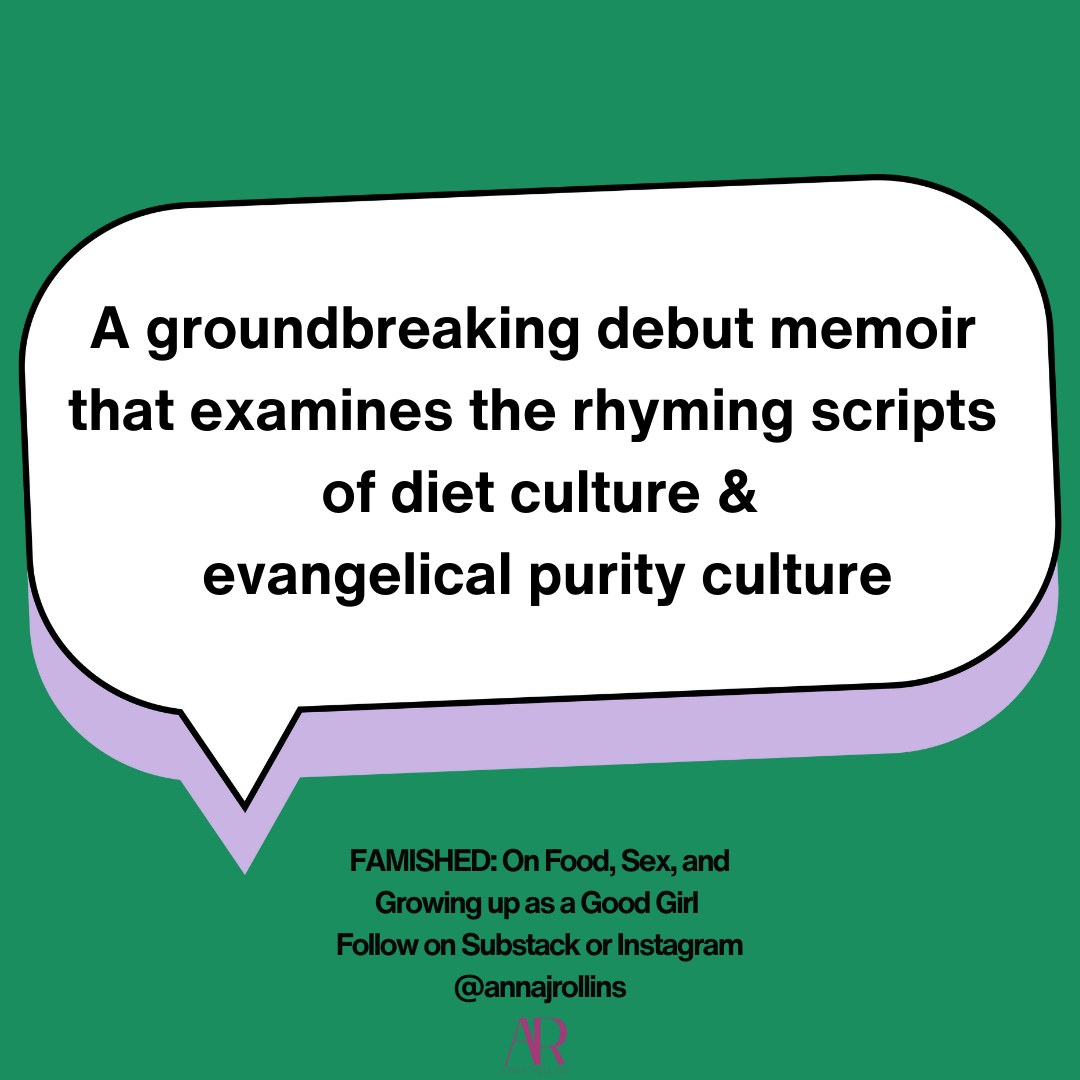🛑Cover Reveal🛑 for FAMISHED: On Food, Sex, and Growing up as a Good Girl
Preorders are LIVE!
Hello, friends!
✨I have some exciting news to share ✨
My cover for FAMISHED: On Food, Sex, and Growing Up as a Good Girl is here.
And it’s gorgeous!
When I texted the image to my college BFF, she said it had some major Miranda July vibes — and I completely agree.
Here it is:
Coming December 9, 2025
& Available for PREORDER now!
Here’s what early readers had to say:
“Beautiful, sharply observant writing”
“Honest and vulnerable”
“An unwitting collector of truly strange experiences in Appalachia in the 1990s and 00s — you know how to present them in a way that seems effortless and unadorned.”
“Blew my mind and explained so much to me about our culture.”
“This book kept me up at night.”
About the Book
A groundbreaking debut memoir that examines the rhyming scripts of diet culture and evangelical purity culture, both of which direct women to fear their own bodies and appetites.
Raised Baptist in an insular Appalachian community, Anna Rollins learned early that among the world’s many dangers, her own body loomed large. So, she dedicated herself to keeping it small—strictly controlling her calories and exercising to the point of exhaustion while murmuring some version of the prayer: “We must decrease so that He can increase.”
She was picking up a similar mantra online: “Nothing tastes as good as skinny feels.” To be a Christian woman was to be thin and chaste, sidestepping any pleasures of the flesh that would cause you—or a brother in Christ—to stumble into sin. But thinness was also a sign of virtue to the outside world. By day, Rollins attended schools and churches where male pastors and older women policed female bodies. By night, she scrolled websites and chat rooms where dieting itself inspired a kind of religious devotion.
Despite Rollins’s piety, anger grew in her chest. “I was all hunger, all need. I was ashamed. But I was also proud. I knew that I was also physical, embodied, a person with desires, despite how frequently I was told that I was not.”
Still, it wasn’t until she found herself obsessing over how she would burn off the pasta she ate for dinner while watching her infant son struggle to breathe in the ICU that Rollins could admit to herself the extent to which she’d bought into the false promises of both purity and diet culture: That if she controlled her appetites, she would be righteous. That if she made herself smaller, she would be safe.
Blending memoir, research, and reporting, Famished untangles these lies and encourages women to reclaim their appetites for life, love, and food, both physical and spiritual. Interweaving her own story of disordered eating and sexual dysfunction with those of other women she interviews, Rollins discovers a sisterhood committed to finding freedom from body shame. Along the way she rewrites her own body’s story to include a purpose much greater than its size or parts or the roles she fills as daughter, wife, and mother, a body well-loved by her and beloved by God.
Who is this book for?
When I was knee-deep in revisions this past summer, my four-month-old daughter was cradled beside me. And as I gazed at her perfect face, then looked back to my own words, I realized something:
My book is for her. My daughter — twenty years from now. As I made each revision, I imagined future-her reading every single word.
But obviously, this book is not just for my daughter.
✨ It’s for people whose lives have been impacted by evangelical culture
FAMISHED is for people deconstructing the message of the prosperity gospel —that one can expect blessings of health and wealth, as long as one follows the will of God. This message is bound up with the politics of white Christian nationalism.
The scripts of both purity culture and diet culture are rooted in beliefs from the prosperity gospel.
Purity culture follows this logic: if I control my sex drive and abstain from sex until my wedding day, then I will have a happy marriage.
And diet culture sells a similar formula: If I control my eating, my body will look better, be better, and I will have a happy life.
These beliefs — about health, wealth, and power — have negatively impacted many people’s relationships with God.
For FAMISHED, I interviewed dozens of women who grew up in conservative Christian culture.
In all my interviews, the most interesting thing I noticed was this: When women worked to heal from body shame, their relationship to religion was intricately involved.
There is significant overlap between evangelical purity culture and diet culture. Both are concerned with keeping women small. Both frame appetite as suspect. Both glory in self-denial — not for the sake of helping others, but as a means of advancing the self.
And both communicate these messages: Our hungers do not give us valuable information about our needs. Appetites are forces to fight.
The reason these philosophies are so powerful and resonant is that, at least on some occasions, this can be true. But not always.
✨ It’s for people who have been impacted by purity culture
The demonization of the body was central to the evangelical purity culture of the 1990s. And evangelical purity culture was not just a religious phenomenon—it was a political force. As a reaction to both the sexual revolution and the AIDS crisis, large amounts of money were poured into abstinence-only sex education and True Love Waits campaigns.
The number of young adults involved in Evangelical purity culture in the 90s was startling: The New York Times estimates that over 2.5 million teenagers took virginity vows through the True Love Waits movement. In that same article, Linda Kay Klein, author of Pure: Inside the Evangelical Movement That Shamed a Generation of Young Women and How I Broke Free, said, “We went to war with ourselves, our own bodies and our own sexual natures [...] all under the strict commandment of the church.”
Even though God declared our bodies good at the beginning of creation, the belief that the flesh is sinful and a source of shame is still present in the church today.
✨ It’s for people who have been hurt by diet culture
Most women have fraught relationships with their own bodies. According to a survey in SELF magazine (with over 4,000 participants), 75 percent of American women report behaviors consistent with disordered eating or clinical eating disorders.
Diet culture is rooted in ideas about morality, as well as white supremacy. In FAMISHED, I examine narratives that speak of dieting with religious language, as well as systems where white bodies and culture are tied to religious systems of power.
✨ It’s for today’s teen girls (and those parenting them) right now.
American teen girls are in crisis –- and they are good at hiding it. As The Washington Post notes, “We’re raising the best-behaved generation of teenagers on record. [...] They drive with seat belts, they smoke less, they have less sex, they wear helmets. They do all these things that we did not do.’ And yet they are in crisis.”
FAMISHED challenges the belief that moralism will save you.
It narrates the story of a good girl in private crisis–and it shows how she got out.
This book is for anyone who has ever taken the difficulties of life’s circumstances out on their physical bodies
At its core, FAMISHED is my story of seeking freedom from bondage—in my relationship to food and to faith. In it, I realize that the love of God doesn’t depend upon my appearance or performance. And, believing that my body was made good, I can’t perfect myself by restricting goodness.
PREORDER TODAY
Preorders are so important in helping debut authors have a successful book launch. It would mean so much to me if you preordered today!
What questions do you have about FAMISHED, purity culture, diet culture, or anything else? Ask me in the comments! And thank you for being here.












"Pure" by Linda Kay Klein was such a pivotal and healing book for me. "Famished" will undoubtedly have a similar impact. This book should be made available in churches, gyms, and women's bathrooms everywhere! Thank you for writing this, Anna. Your daughter is so lucky!
Congratulations! I love the cover design. I pre-ordered a copy as a Christmas gift to myself and am looking forward to my winter break read. I have been using "The Body is Not an Apology" to heal from being immersed in diet culture my entire life, and I know this book will also be an incredibly relevant and helpful read on my journey toward accepting and loving my body. Thank you for sharing your journey.